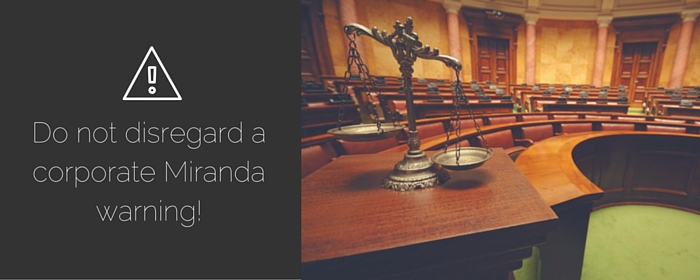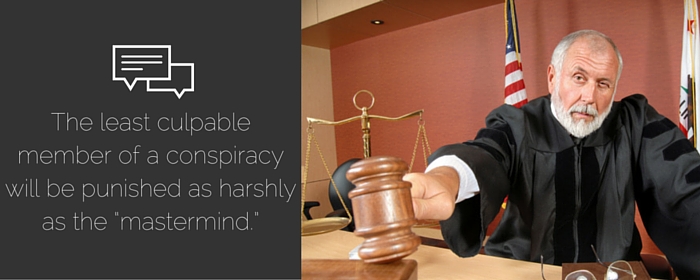White collar criminal investigations and prosecutions are increasing in the state of New York and across the United States. Especially if you work for a corporation or a financial institution, it is imperative to avoid the behaviors that can, even inadvertently, trigger a federal white collar criminal investigation. While every white collar criminal case is unique, the signs that you are being investigated are more or less similar in almost every white collar crime investigation. If you are suspected of a white collar crime in New York, immediately contact an experienced Long Island criminal defense attorney. In no particular order, here are five more ways to protect yourself if you become a target of a white collar criminal investigation:
1. UNDERSTAND WHAT A “CORPORATE” MIRANDA WARNING MEANS
When you receive a corporate Miranda warning from your own corporation’s attorney, it’s time to retain your own personal lawyer. Most corporate employees assume that their communications with corporate counsel about a legal problem are privileged and that they are free to talk with corporate attorneys about problems at the company. They are not. A corporate attorney represents only the company itself, not the employees as individuals, and without exception, that attorney has no confidentiality obligation to employees.
In the groundbreaking case Upjohn Co. v. United States (1981), the United States Supreme Court held that in communications with corporate counsel, the confidentiality privilege is enjoyed only by the company and not by the employee. While the Supreme Court justices writing the Upjohn decision did not explicitly mention giving a warning to employees, the case has given rise to a practice called the “Upjohn warning,” in which a company’s lawyer explains that he or she represents only the company and not the individual employee with whom the lawyer is dealing. This warning is intended to ensure that the employee understands that the company can waive the attorney-client privilege at any time and may disclose the contents of the conversation between the lawyer and the employee even if the employee objects.
What does that mean for you if you are a corporate employee? If a federal prosecutor comes knocking, the company alone will determine whether your conversations with corporate counsel are considered privileged. And while you may presume that your company wants to remain loyal to you, the fact is that corporations in that situation face substantial pressure to waive attorney-client privilege. For many companies, the decision is easy. They will tell the government whatever it wants to know and hope that the company will be spared from prosecution in return for its cooperation.
As a result, in recent years there has been an increasing focus on so-called Upjohn warnings (otherwise known as “corporate” Miranda warnings). However, many corporate executives dismiss this warning as standard legal talk and assume that their company will treat their conversations with corporate counsel as confidential and privileged. Do not make that assumption or disregard a corporate Miranda warning. The hard reality is that when you receive a corporate Miranda warning, you need to retain your own attorney who will watch out strictly for your personal interests. A corporate attorney will never advise you to retain your own lawyer because his or her job is to elicit information on behalf of the corporation and not to provide legal advice or confidentiality to its individual employees. The bottom is line is that if you are given a corporate Miranda warning, you very much need to retain your own attorney as quickly as possible.
2. USE CAUTION WHEN YOU WRITE AND SEND EMAILS
Another rule about everyday activities that will help you steer clear of white collar prosecutions is to be careful about what you say in your emails. Everything you say in an email can and will be used against you by the government in a white collar criminal prosecution. Every email you send is recorded somewhere and will remain available to the government for years to come. Never assume that the person receiving your email will be the only person reading it.
Absolutely avoid aggressive or “loose” language in any emails you send. Emails with phrases such as “killing” the competition, checking with “inside” sources, and, worse of all, “we shouldn’t be talking about this,” can, even years later, be twisted to look surreptitious and criminal regardless of your original intention or meaning. In almost every white collar criminal investigation, the government targets a few colorful emails that make the person look guilty. The bottom line is that sensitive topics must be dealt with only in face-to-face or telephone conversations. Always assume that every email you compose and send will be read later – by a party you that did not intend it for – and interpreted in the worst possible light.
3. AVOID ANYTHING THAT COULD LOOK LIKE ACCOUNTING FRAUD
Another risk factor is the degree to which your company’s profitability depends on accounting. Accounting can work for you, and it can also work against you. Anything that seems like a clever accounting maneuver will later, in the harsh light of a business failure, look like accounting fraud. If there is a great deal of attention given to how your corporation accounts for revenue, there is a tendency for prosecutors to charge that management either pressured or deceived the accountants into using accounting practices designed to mislead shareholders and the public as to how well the company was doing. Accounting fraud is a basic tool used by many white collar criminals, and more often than not, it is the non-accountants who find themselves accused of accounting fraud. Just because you are not an accountant or responsible for accounting doesn’t mean that you won’t be accused of accounting fraud. If accounting decisions are crucial to your business, make sure that you have clear guidance about what information needs to be disclosed to the accountants and auditors.
4. GO WITH YOUR INSTINCTS
If something doesn’t feel right in any business situation, it probably isn’t. Many white collar criminal defendants can point to an exact moment when they realized that something was not right in their business dealings. A person’s reticence to speak up or take action at that moment can swiftly lead to serious legal trouble. Federal prosecutors don’t limit their investigations to the architect of a particular crime; rather, they look to investigate every person who was directly or even indirectly complicit in the criminal activity.
Federal and state laws governing white collar crimes typically do not recognize any concept of “relative” responsibility, so in most white collar cases, the least culpable member of a criminal conspiracy will be punished as harshly upon conviction as the central figure or “mastermind.” Corporate executives are presumed to know everything that happens at their companies, and it is genuinely difficult for an executive to argue that he or she didn’t have enough information to know that something fraudulent was happening. The bottom line here is that if something feels suspect or seems too good to be true, it most likely is. Always go with your instincts and proactively remove yourself from a questionable situation as quickly as possible.
5. DO NOT ATTEMPT A COVER-UP
Attempted cover-ups are usually worse – for those conducting the cover-ups – than the original crimes they are attempting to conceal. For example, in the cases of Barry Bonds and Martha Stewart, both celebrities were convicted not for the crimes that initially led investigators to them but for their efforts to cover up those crimes. Because it is often easier to prove than the original crime, a botched cover-up can quickly become the focus of a prosecutor’s investigative efforts. An attempted cover-up may become “smoking gun” evidence that an “original” crime was committed by those conducting the cover-up. A prosecutor can reasonably argue that a defendant knew what he or she did was illegal because the defendant tried to cover it up by lying, deleting emails, contacting others to coordinate their stories, and similar actions. Ordinary people – the kind who sit on juries – fully understand that these are the actions of someone with a guilty conscience. If your defense to a white collar criminal charge is “I didn’t think that I was doing anything illegal,” any effort to cover up the alleged crime will cast substantial doubt on the veracity of your defense.
If you become the target of a white collar criminal investigation, do not try to wrangle or manipulate your way out of it. It’s best to hire your own lawyer and say nothing, even if it means taking a temporary public relations hit. The problem with trying to clear your name at the front end of the investigation is that you don’t know what evidence the prosecutors possess, and you can make statements that you think are harmless but that later come back to haunt you during the investigation or prosecution.
The best way to protect yourself during a white collar criminal investigation is to consult with and adhere to the advice of a reliable and experienced criminal defense attorney. If you need to learn more about white collar crimes and white collar criminal investigations in the state of New York, let us answer your questions and address your concerns. If you need legal advice or representation regarding a criminal matter in the state of New York, contact an experienced Long Island criminal defense attorney as quickly as possible.













Comments are closed.